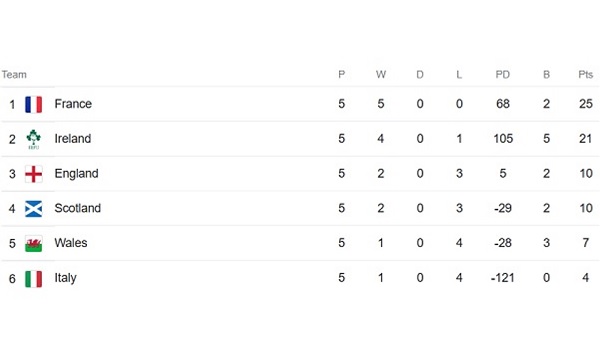
In the first article of our coverage of this year's 6 Nations rugby, Chronicle.lu looks at the lead up to the tournament and some of the issues behind the scenes.
The 6 Nations rugby tournament is about to kick off next weekend (Wales host Ireland for the opening match on Saturday 4 February), with the five rounds of matches concluding on Saturday 18 March when Ireland host England.
This being a World Cup year - France hosts the 10th tournament that is held every four years since the first tournament in 1987 - has added a bit of spice to the tournament, with teams jostling for supremacy in the world rankings and players wanting to make their countries' World Cup squads. And there is the tournament itself, the coveted trophy and bragging rights of which all teams would like to win.
Firstly, we can have a quick look at how rugby teams have been faring in European competition.
In this year's European Rugby Champions Cup (the Heineken Champions Cup), the four "group" rounds of matches have concluded, with the round-of-16 ties due to take place after the 6 Nations, on the weekend of 31 March to 2 April. Of the sixteen teams left in the competition (remember, France's Top 14, the English Premiership and the United Rugby championship each had eight representatives), England have five teams left, France have three and the United Rugby Championship have eight (Ireland and South Africa both have three, with Wales and Scotland both having one each, with Italy not represented).
Taken alone, that would indicate that England (five) have a stronger interest than both France (three) and Ireland (three); nevertheless, the top teams in the two groups were Leinster (Ireland; four-times winners) and La Rochelle (France; one-time winners), the same two teams who contested the 2022 competition; Toulouse (four-times winners) were the only other team to also win all four games. On that account, France and Ireland teams have the strongest showing, but Saracens (England) can never be discounted!
Last year saw France win the 6 Nations tournament with 25 points (they won all five matches), with Ireland second on 21 points (they only lost one, to France in Paris). Those two teams were a class apart, with England and Scotland just winning two games apiece, and Wales and Italy just one apiece. With Ireland #1 in the world rankings and France #2 (England are #5, Scotland #7, Wales #9 and Italy #12). With Ireland at home to France in Round 2 on 11 February, this could be the decider...
But this is taking a simplistic view, looking at past results, rankings and statistics; it does not take into account the sheer unpredictability of the sport and the tournament, nor the passion that players and supporters alike have for success on the field. Yes, there will be a lot of talking (and writing) in pubs, at home in the media and online, but it is what happens when the whistles go on the pitches.
Another issue that deserves looking into is happenings off the pitch: the Welsh Rugby Union is facing allegations of bullying and sexism within the organisation, and French rugby president Bernard Laporte has resigned following being found guilty by a court of passive corruption. Neither of these should affect what happens on the pitch, where the issue of concussion remains at the centre of law changes to protect players from blows to the head: the results of some European club games has been decided on the basis of teams losing players to yellow and red cards following dangerous tackles/play - this could also affect one or more games in the 6 Nations.
Critics of the tournament argue that there should be relegation from the "elite six" teams that compete - Italy (ranked #12 in the world) joined in 2000; despite their opening game against the reigning champions Scotland, they have fared poorly by winning just eleven of their 115 games in 22 seasons, of which eight have been at home.
In the autumn internationals, Georgia (ranked #13) stunned Wales in Cardiff in November; Romania (#20) and Portugal (#18) are also playing in the 2023 Rugby World Cup in France in the autumn, while Spain is ranked #16.
The second article in the 6 Nations previews will look at the six teams.








